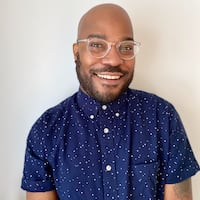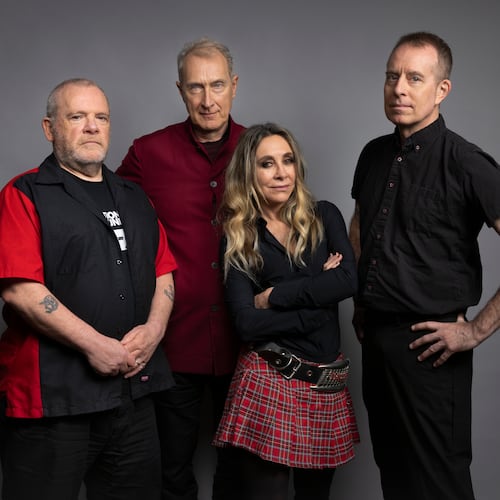The kids had no idea.
Sitting on a stage at the Ray Charles Performing Arts Center in West End, almost two dozen Black college students from Morehouse College, Spelman College, Clark Atlanta University and Georgia State University were shocked when Andre 3000 walked out to greet them.
Rocking a black Supreme coat, blue overalls, red beanie and Air Jordan 3 sneakers, the legendary OutKast emcee greeted the students with a smile and hometown acknowledgement: “It feels awesome to be home.”
Credit: Gem Hale
Credit: Gem Hale
Andre 3000 is in town doing several shows at Variety Playhouse and Center Stage in promotion of his album, “New Blue Sun,” which finds one of rap’s greatest emcees trading bars for woodwinds.
As part of programming for Sony Music University, local students pursuing careers in the industry took part in a discussion with the legendary artist. The talk was led by artist Fahamu Pecou and hip-hop scholar Joycelyn Wilson, who touched on everything from Andre’s views on changing Atlanta to assessing the response to “New Blue Sun.”
Andre also took questions from students about whether he still loves rapping, finding inspiration in isolation and performing live with flutes instead of a microphone. The Atlanta Journal-Constitution sat in on the conversation.
Here’s what we learned.
Being back in Atlanta and seeing how the city has changed for Black creatives
Andre explained that he hasn’t been home in six years, so he’s been taking in the city’s changes while here.
“It has me in a reflective kind of state because this city has birthed a lot of pioneers, people that are pushing things. There’s just so much from when we started, even before us, but from Dungeon Family and what Future is doing and Playboi Carti. ... It’s just amazing stuff that’s come out of the city. ...
In the city that we were kids doing stuff, now those kids are doing awesome things in a different way. The rest of the world was looking at them still and getting influence from Atlanta still. When we were in high school, Atlanta did not have an identity at all. It was New York or West Coast rap music and that was it.”
Credit: Gem Hale
Credit: Gem Hale
Looking back on his ‘South got something to say’ moment
Though his clarion call to action went on to become a cool t-shirt slogan and an AJC documentary, Andre still feels emotional about it.
“A lot of people referenced that piece of footage and that saying, but I think a lot of people don’t know what happened right before, why I actually said this. Even the person reading the paper when they said that ‘the winner is OutKast’ it was like a ‘who the (expletive) is this’ kind of thing. I was acting out of nervousness. It was more out of discussing you trying to big up your city, your team. I just felt like they didn’t know us well enough. So that saying came out of the boos. So it was the situation that sparked that saying that people quote now, which I guess is fitting.”
If he still gets excited about rapping
Andre said he and his publicist made a point to let audiences know there would be no rapping on “New Blue Sun.” He said it wasn’t an effort to troll fans, but to just be up front and honest.
“I write all the time. I may not write it in a rap form. And most of the time it may not start as a rap. Sometimes it’s just a thought and I’ll write it down. I’m inspired by something all the time. And I think because I’m 48 now, [I’m] challenging myself to do something that is pushing myself, challenging myself to not getting stuck in a pattern. When you rap long enough, you really realize that it’s really all patterns. It’s like, I guess it means it’s 8, 16, 32, 64. It’s a challenge for me to figure out what can I do or how I can do it.
I got to figure out how do I say what a 48-year-old person is or feels or sees, but do it in an inspiring way where I’m not trying to mimic a certain person or trying to fit in or trying to rest on what I already know. So I’m inspired by the possibilities of what can happen.”
If he was worried about negative audience responses to “New Blue Sun”
Yes, Andre has been tracking responses to “New Blue Sun” after it released. Beforehand? Not so much.
“I didn’t think about it, if I’m being completely honest. I only thought about the audience when I was naming the songs. This is a good practice to me for artists. I don’t care if it’s visual, sonically, considering the audience, it’s part of your process. Considering an audience should probably happen after it’s done. I think it keeps it a little bit more pure. I wasn’t thinking, ‘They’re going to love these things from the flute.’
It wasn’t that. It was like we made this music that I felt like was a thing of beauty, which at this age, my intention is to present things with beauty.”
Credit: Gem Hale
Credit: Gem Hale
Finding a new muse by dropping drugs
Andre referenced watching the documentary “Chasing Coltrane” which explains how John Coltrane and Miles Davis — two genius musicians — kicked their heroin habits, and its effect on their creativity. In response to the discussion about artists finding their muse in isolation, Andre spoke about a change in his creative process by listening to his body decades ago.
“At a certain point I was just smoking every day, all day, back to back to back. Just in the studio chain smoking blunts. There came a point where I just stopped and I took off. I’m not against marijuana at all, but sometimes I think you have to be honest with yourself to figure out what works for you. ... Some people can get high and kill it and it’s awesome. Some people can’t.”
Doing live shows as a flutist versus an emcee
Andre was asked how he manages performing as an instrumentalist as opposed to an emcee.
“I hope this is not a bad thing to say, but it’s the truth: I think rappers have it the easiest on stage, especially now. When I say rappers had it the easiest, you have the beat that people know, you have a song people know, you have the chorus that people know, you have your verse that you can just put your microphone and let everyone else do.
What we’re doing now, you can’t lean on a thing. So it is very exciting for me to have come from rap to do what I’m doing now. So the shows are very much alive. ... We don’t know what’s coming, we don’t know what’s happening.”
About the Author
Keep Reading
The Latest
Featured





